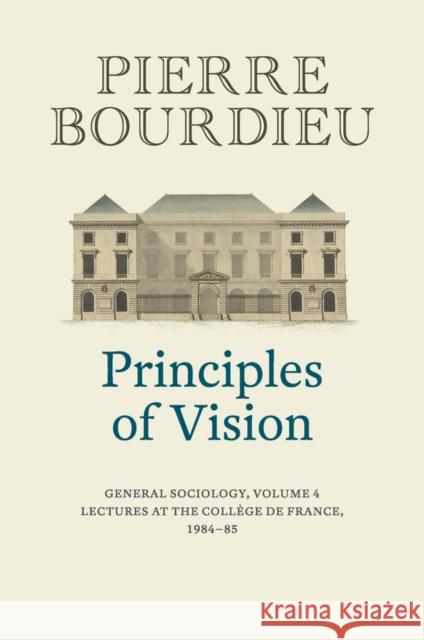Principles of Vision, Volume 4: General Sociology » książka



Principles of Vision, Volume 4: General Sociology
ISBN-13: 9781509526710 / Angielski / Twarda / 2022 / 278 str.
Principles of Vision, Volume 4: General Sociology
ISBN-13: 9781509526710 / Angielski / Twarda / 2022 / 278 str.
(netto: 147,30 VAT: 5%)
Najniższa cena z 30 dni: 152,46
ok. 30 dni roboczych.
Darmowa dostawa!
Editorial NoteAcknowledgementsLecture of 7 March 1985Inventory - Capital and power over capital - The process of differentiation - Objectivism and perspectivismLecture of 14 March 1985First session (lecture): the elasticity of objective structures - A programme for the social sciences - Reintroducing the point of view - Reintroducing objective space - A political sociology of perception - The theory effect - Social science and justice.Second session (seminar): the invention of the modern artist (1) - The programme for future painters - What is at stake in the struggle - A revolution in the principles of vision - Academic artists.Lecture of 28 March 1985First session (lecture): going beyond perspectivism and absolutism - Scientific categories and official categories - The struggle over perspectives - Practical logics - Political creation - The theory effect and the master-thinkers.Second session (seminar): the invention of the modern artist (2) - Perhaps the writers should write about nothing? - The master and the artist - A symbolic revolution - Historical painting - A lector's painting - The de-realization effect.Lecture of 18 April 1985First session (lecture): the sociological relation to the social world - A materialist vision of symbolic forms - Perception as system of oppositions and discrimination - Investing in the game of the libidines - The passage from action to discourse on action - The political struggle for the right vision.Second session (seminar): the invention of the modern artist (3) - Writing the history of a symbolic revolution - The surplus of educated men and the academic crisis - The education system and fields of cultural production - The morphological effects - The effects of the morphological crisis on the academic field.Lecture of 25 April 1985First sssion (lecture): thinking the already thought - The liberty and autonomy of a field - A question about symbolic power - The political struggle as struggle for the legitimate vision - Symbolic capital and gnoseological order - The law as the right way to speak of the social world - The verdict of the State in the struggle for identity.Second session (seminar): the invention of the modern artist (4) - The psychosomatic power of the institution - The symbolic work of the heretic - Collective conversion - The strategies of the heresiarch - A revolution affecting the ensemble of the fields of cultural production.Lecture of 2 May 1985First session (lecture): collective bad faith and struggles for definition - Justification of a decision to buy and competing viewpoints - 'Taking apart' and 'putting together' - Subjective manipulations and objective structures - Managing the collective capital of the group - Effects of the corps.Second session (seminar): the invention of the modern artist (5) - The alliance of painters and writers - The artist's way of life and the invention of pure love - Artistic transgression today and a century ago - The mercenary artist and art for art's sake.Lecture of 9 May 1985First session (lecture): certification and social order - The principle and justice of distributions - Private charity and public welfare - The three levels of analysis of a distribution - Where is the State? - Verdicts and the effects of power - The field of certification.Second session (seminar): the invention of the modern artist (6) - Academic painting as a theological universe - Institutionalizing perspectivism - The invention of the artist as character - The painter-writer couple.Lecture of 23 May 1985First session (lecture): Paul Valéry's insights - Amateur and professional - Bureaucracy as a massive fetish - Categorial mediation - Validated perception - Science and the Science of the State.Second session (seminar): the invention of the modern artist (7): Polycentrism and the invention of institutions - The false antimony of art and the market - The collective judgement of the critics- The three reproaches.Lecture of 30 May 1985Providing a theoretical perspective - The Kantian tradition: symbolic forms - The primitive forms of classification - Historical and performative structures - Symbolic systems as structured structures - The Marxist logic - Integrating the cognitive and the political - The division of the labour of symbolic domination - The State and God.Situating the Third and Later Volumes of General Sociology in the oeuvre of Pierre Bourdieu by Julien DuvalSummary of Lectures of 1984-1985NotesIndex
Pierre Bourdieu (1930-2002) was one of the most influential sociologists and anthropologists of the late twentieth century. He was Professor of Sociology at the Collège de France and Director of Studies at the École des Hautes Etudes en Sciences Sociales. His many works include Outline of a Theory of Practice, Distinction: A Social Critique of the Judgement of Taste, The Rules of Art, The Logic of Practice and Pascalian Meditations.
1997-2026 DolnySlask.com Agencja Internetowa
KrainaKsiazek.PL - Księgarnia Internetowa









